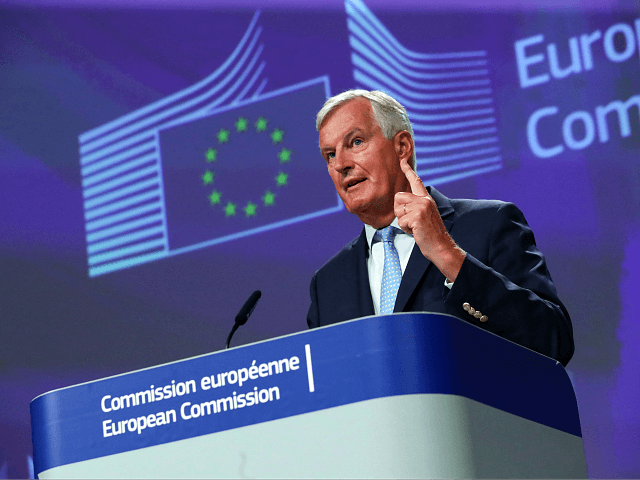European Union negotiators have reportedly rejected a British offer of a bilateral pact to return illegal migrants, while a seventh round of Brexit trade negotiations has again ended in deadlock.
Under the EU’s Dublin III regulations, migrants can be returned to the EU member-state where an asylum claim was first made. This covers some of the migrants currently crossing the English Channel from France in small boats, but once the United Kingdom leaves the EU’s institutions at the end of the present transition period on December 31st, 2020, that arrangement comes to an end — meaning that there may be no structure to return the thousands of illegals who have left French shores for Britain.
Sources speaking to left-wing Guardian on Thursday said that Brussels negotiators have rejected the offer of bilateral arrangements outside of the bloc, the report coming amidst rising tensions between London and Paris over France’s failure to stop around 5,000 illegals from crossing the English Channel since January.
“The proposal, from the EU perspective, isn’t very operational and doesn’t bring a lot of added value,” an EU source told The Guardian.
A Home Office spokesman responded to the report, saying: “The Dublin III regulation is inflexible, rigid and is abused by both migrants and activist lawyers to frustrate the returns of those who have no right to be here. Whilst we are bound by Dublin for the duration of the transition period, the UK will be able to negotiate its own bilateral returns arrangements from the end of this year.”
French MP for Calais Pierre-Henri Dumont attempted to blame the British for a drowning death in the Channel this week, claiming that the British government should make it possible for asylum seekers to lodge a refugee application from outside of the country.
It is unlikely this would have helped the drowned man, however, as according to relatives the French had themselves already rejected an asylum claim by him in their country as illegitimate.
The French have been caught on numerous occasions escorting migrant boats into British territorial waters, where they often coordinate with UK Border Force in the handing over of the illegals.
Meanwhile, the latest round of negotiations between the UK’s David Frost and the EU’s Michel Barnier has ended without a deal.
Speaking on Friday morning, Mr Barnier said that it “seemed unlikely” that the two sides would strike a trade deal by October, which the bloc has said is its final deadline in order to have the agreement ratified by the European Parliament before the end of the transition period.
The United Kingdom officially left the European Union on January 31st, 2020, but is in a transition period until the end of the year. During this time, the country remains subject to the EU’s institutions and rules, including the Customs Union, Single Market, and associated free movement migration regime.
If London cannot agree on the continuity of some arrangements with Brussels by the autumn, the United Kingdom will trade with the bloc on World Trade Organization (WTO) rules.
In fulfilment of the will of the referendum, Britain is rightly demanding the return of full sovereignty over her trade policy, borders, and laws. The EU, however, wants the British to abide by a host of Brussels rules, including restrictions on state aid and continued long-term access to Britain’s lucrative fishing waters.
British negotiator David Frost said that the EU’s intransigence made it “unnecessarily difficult to make progress”, but remained firm that he would only progress a deal that “ensures we regain sovereign control of our own laws, borders, and waters”.
The British even offered a draft “consolidated” free trade agreement to the EU which records those matters that both parties can agree on, as a means of progressing discussions, according to The Times; but, given the course of talks, it is an agreement that Brussels is unlikely to accept.
In response to the deadlock, former Brexit Party MEP Martin Daubney said: “It’s Brexit Groundhog Day again, as Barnier admits ‘no progress whatsoever’ has been made on fisheries & the level playing field ‘isn’t going away’.
“Translation: he isn’t getting his own way, and the UK isn’t being bullied.
“Let’s go WTO!”

COMMENTS
Please let us know if you're having issues with commenting.